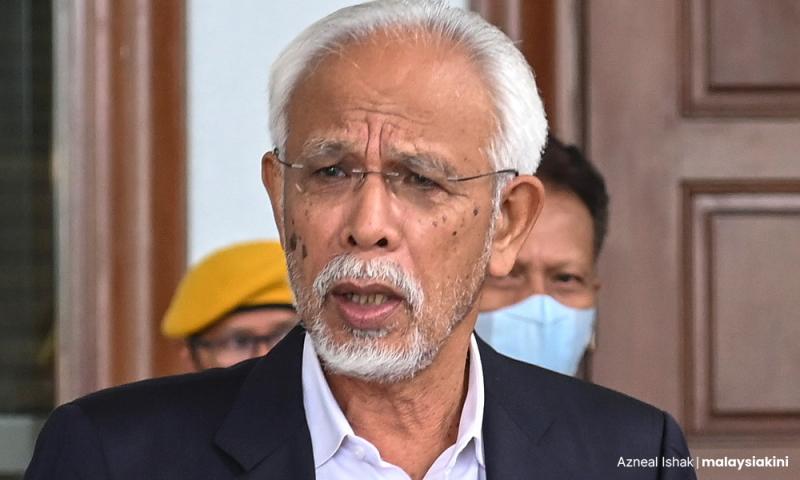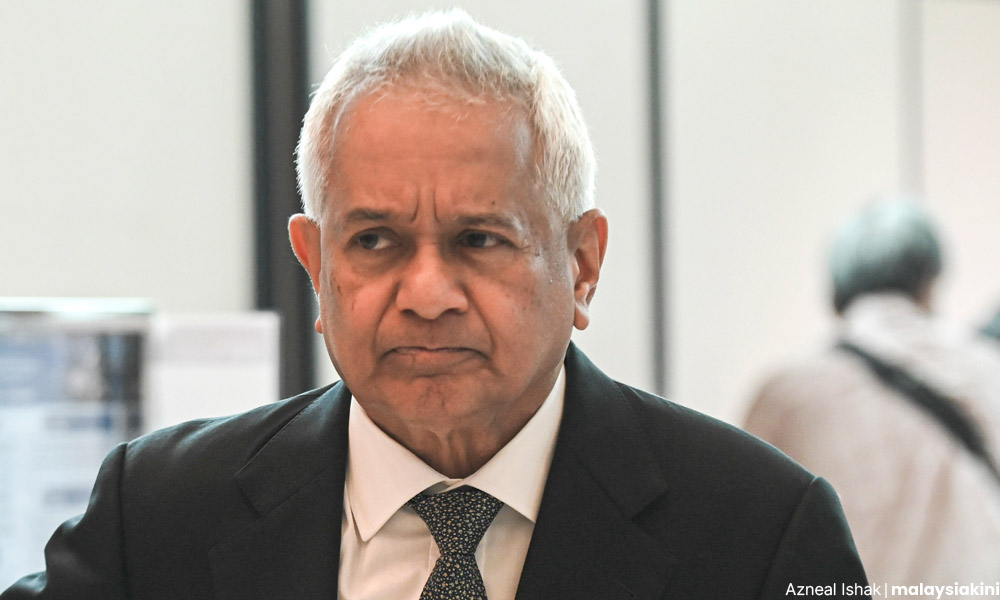
Shahrir sues Thomas, Latheefa, govt for 'malicious prosecution'
Former Felda chairperson Shahrir Samad has filed a suit against former attorney-general Tommy Thomas, former MACC chief Latheefa Koya, MACC and the government for alleged malicious prosecution.
The writ of summons was filed by Messrs Fahri, Azzat & Co at the Kuala Lumpur High Court registry on Dec 4.
In the statement of claim, Shahrir said he is also suing the quartet for malicious investigation and wrongful arrest.
This is over the money-laundering case involving RM1 million received from former prime minister Najib Abdul Razak, of which he was acquitted on Jan 5.
The full acquittal came on the heels of testimony from a prosecution witness, MACC investigating officer Nurzahidah Yacop, that Thomas in 2020 gave the green light for Shahrir to be charged in court despite an incomplete investigation paper.

Former attorney-general Tommy Thomas
In his suit, the former Johor Bahru MP claimed Thomas had failed to order for the probe of the case to be completed before deciding to grant permission to prosecute.
“Thomas, as the attorney-general at that time, had issued permission to prosecute even though the investigation papers presented to him were still incomplete,” the court document read.
Shahrir has also claimed that MACC, under Latheefa at that time, had deliberately failed and refused to investigate his testimony which informed that the RM1 million that he received was for the purpose of reimbursing the money he had advanced from his personal savings account for the rehabilitation works on the Puri Langkasuka project.
“MACC, under Latheefa, had also deliberately disallowed the anti-graft agency’s investigation officer to investigate it from the reimbursement angle.
“The agency also did not take measures to ask the Inland Revenue Board to determine the status of whether the RM1 million was the plaintiff’s income or not, before charging the plaintiff in court.
“MACC had also brought and referred the incomplete investigation papers to Thomas to get instructions to charge.”
Shahrir then asserted that both Thomas and Latheefa’s actions as public servants, on the matters mentioned, were an abuse of their power or public authority.
In his suit, the former Johor Bahru MP claimed Thomas had failed to order for the probe of the case to be completed before deciding to grant permission to prosecute.
“Thomas, as the attorney-general at that time, had issued permission to prosecute even though the investigation papers presented to him were still incomplete,” the court document read.
Shahrir has also claimed that MACC, under Latheefa at that time, had deliberately failed and refused to investigate his testimony which informed that the RM1 million that he received was for the purpose of reimbursing the money he had advanced from his personal savings account for the rehabilitation works on the Puri Langkasuka project.
“MACC, under Latheefa, had also deliberately disallowed the anti-graft agency’s investigation officer to investigate it from the reimbursement angle.
“The agency also did not take measures to ask the Inland Revenue Board to determine the status of whether the RM1 million was the plaintiff’s income or not, before charging the plaintiff in court.
“MACC had also brought and referred the incomplete investigation papers to Thomas to get instructions to charge.”
Shahrir then asserted that both Thomas and Latheefa’s actions as public servants, on the matters mentioned, were an abuse of their power or public authority.

Former MACC chief Latheefa Koya
He claimed that it was done with the intention of injuring, defaming and tarnishing his reputation.
Therefore, the Umno veteran demanded compensation of RM10 million from the defendants for the mental, emotional and physical torture as well as compensation of RM10 million for the damage to his reputation or general damages as well as an additional compensation amounting to RM10 million to be assessed by the court.
Also sought was an unconditional apology published in the form of a full page in main national newspapers in Malay, English, Chinese and Tamil, where the apology must be approved by the plaintiff before being published.
The court has fixed Dec 26 for case management via e-review.
On Jan 13, Shahrir had reportedly lodged a police report against Thomas for alleged abuse of power over the RM1 million money-laundering case.
Separately, taking it to Facebook, he also claimed that Thomas had hauled him to court to smear his image and to have him labelled as corrupt.
However, FMT reported that Sentul police chief Beh Eng Lai as saying that the report had been classified by the cops as requiring “no further action”.
This, Beh said, was because “an attorney-general has absolute discretion to charge anyone under Article 145(3) of the Federal Constitution”.
Article 145(3) stipulates that the attorney-general shall have power, exercisable at his discretion, to institute, conduct or discontinue any proceedings for an offence, other than proceedings before a shariah court, a native court, or a court martial.
He claimed that it was done with the intention of injuring, defaming and tarnishing his reputation.
Therefore, the Umno veteran demanded compensation of RM10 million from the defendants for the mental, emotional and physical torture as well as compensation of RM10 million for the damage to his reputation or general damages as well as an additional compensation amounting to RM10 million to be assessed by the court.
Also sought was an unconditional apology published in the form of a full page in main national newspapers in Malay, English, Chinese and Tamil, where the apology must be approved by the plaintiff before being published.
The court has fixed Dec 26 for case management via e-review.
On Jan 13, Shahrir had reportedly lodged a police report against Thomas for alleged abuse of power over the RM1 million money-laundering case.
Separately, taking it to Facebook, he also claimed that Thomas had hauled him to court to smear his image and to have him labelled as corrupt.
However, FMT reported that Sentul police chief Beh Eng Lai as saying that the report had been classified by the cops as requiring “no further action”.
This, Beh said, was because “an attorney-general has absolute discretion to charge anyone under Article 145(3) of the Federal Constitution”.
Article 145(3) stipulates that the attorney-general shall have power, exercisable at his discretion, to institute, conduct or discontinue any proceedings for an offence, other than proceedings before a shariah court, a native court, or a court martial.
No comments:
Post a Comment